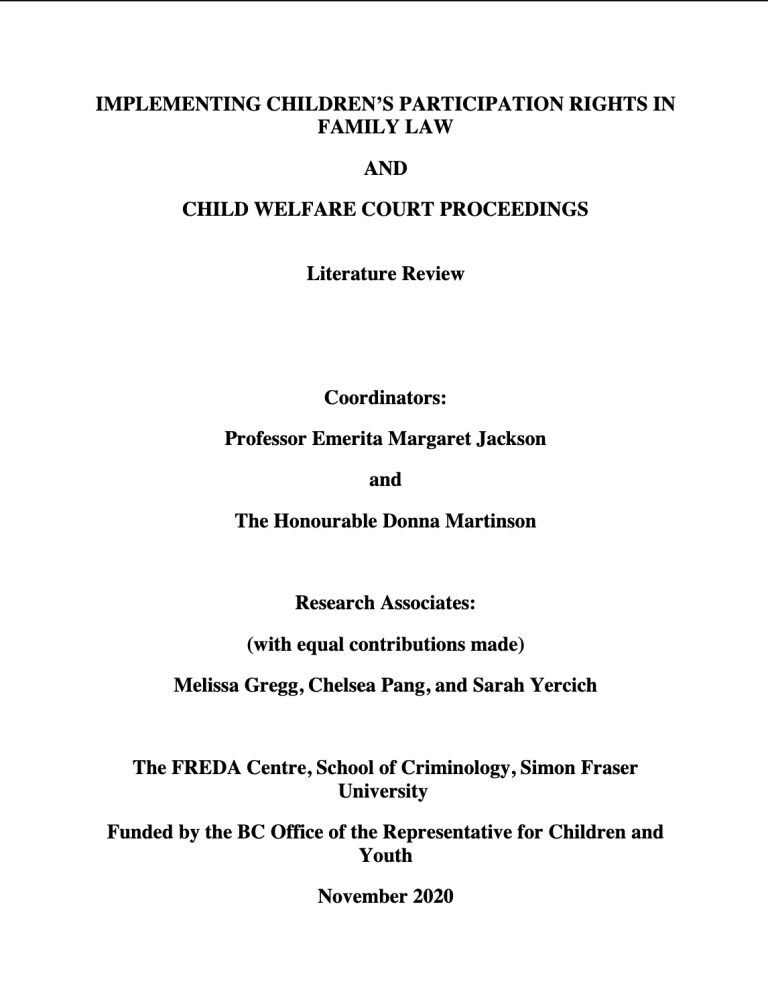5 search results
for
Independent offices of the Legislature
Increasing attention (and resources) must be given to children’s representation
Recommendation 7: Academic scholarship and policy papers focused on children’s rights to representation point to the need for increased funding from government sources, to provide consistent and dependable counsel for children (Bala & Birnbaum, 2019; Byrne & Lundy, 2019; Canadian Coalition for the Rights of Children, 2016; Collins, 2019). However, it is also notable that none of this literature provides specific guidance as to where extra funding should be sourced or how new programming may be implemented to maintain both efficient and effective legal assistance for children to facilitate the expression of their views in a legal setting. In particular, the CBA Alternative Report (2020) suggests that in B.C., absolutely no funding is set aside for children’s representation (p. 33). This is particularly problematic in relation to immigrant, refugee, and Indigenous children (CBA, 2020). This may be the case for two reasons: 1) an overall lack of resources (particularly given the current local and international economic climate in the wake of Covid-19 – see Garlen, 2020); and/or 2) a lack of awareness at the federal level of the critical importance of this issue, and the ‘domino effect’ of reduced rights for vulnerable populations. As a result, it is recommended that policy organisations focused on this issue work to demonstrate whether and how additional funding can be allocated to children’s legal representation. In New Zealand, for example, the Family Court (Supporting Families in Court) Legislation Bill forms part of a $62 million package that restores the right to legal representation at the start of a care of children dispute in the Family Court (Government of New Zealand, 2020, p. 1). Enhanced attention and funding at the federal level can only benefit both those organisations focused on this area, as well as beneficiary populations.-
Category and theme:
Audience:
Groups affected:
Participation and representation generally
Protect and guarantee participation rights for children
Recommendation 8: Children’s rights, participation, welfare, and best interests are unquestionably interlinked. Children are persons with their own legal rights and must be guaranteed the right to participate in guardianship and family law proceedings (Grover, 2015; Martinson & Tempesta, 2018). Children’s rights to participate are in line with the UNCRC’s recommendations and FLA’s best interests provisions (Dundee, 2016), and work to safeguard and prioritize children’s voices and preferences about their own well-being.-
Category and theme:
Audience:
Groups affected:
Participation and representation generally
Implement an empowerment-based approach to participation and representation
Recommendation 9: Development and cognitive functioning should not prohibit children’s participation in court proceedings, as this denies children their fundamental rights based on perceived functioning and undermines the UNCRC’s recommendations (Grover, 2014; Martinson & Tempesta, 2018). Instead, an empowerment-based approach must be adopted and implemented that promotes, prioritizes, and ensures children’s participation in guardianship and family law proceedings regardless of age or capacity. An empowerment-based approach would be child-centred and incorporate strategies that would ensure children’s participation regardless of age and/or capacity, including legal representation, judicial interviewing, VCRs, and child-inclusive mediation.-
Category and theme:
Audience:
Groups affected:
High risk legal proceedings
Ensure children’s participation in high-risk cases
Recommendation 12: High risk cases (e.g., high conflict, presence of violence, allegations of parental alienation) pose a threat to children’s legal right to participation (Martinson & Raven, 2020b; Morrison et al., 2020). As such, safeguards must be put into place that ensure children’s rights are respected and that their access to justice and best interests are advanced in high-risk cases.-
Category and theme:
Audience:
Groups affected:
Law reform
Recommendation 15: The Supreme Court of Canada, in Michel v. Graydon, which specifically deals with the B.C. Family Law Act, discusses principles that apply to the interpretation of statutes which directly bear on the role of the B.C. Legislature in upholding children’s rights, including their participation rights. The concurring judgment states: (1) that the Legislature is presumed to take into account Canada’s international obligations, which includes those found in the CRC (at para. 103); and (2) that the Legislature is taken to know the social and historical context in which it makes its intention known (at para. 97). The literature, taking an approach consistent with these principles, suggests that the Legislature plays a critical role in implementing children’s right to participate effectively in court processes. Though many important legislative, regulatory and policy steps have been taken, the literature identifies several others that are necessary to meet B.C.’s obligations to children in family law and child welfare processes. They include the specific incorporation of the CRC in both the FLA and the CFCSA, ensuring that both court processes incorporate procedural safeguards and guarantees, making sure that children in court processes are fully informed of their participatory rights and allowing children to apply for declarations relating to their best interests.In addition, specific legislative changes and clarifications are necessary in the FLA and the CFCSA. For the FLA, these include a review of the following sections: s. 37(1) (b), views of the child; the s. 1 definition of family violence (to clarify that intent is not required); s. 203, dealing with legal representation; s. 199, dealing with conflict and family violence; and s. 37(2)(j), considering any other civil or criminal proceeding. For the CFCSA, amendments are required which provide the legal advice and representation children require throughout the processes, as well as specific provisions relating to hearing children’s views.
-
Category and theme:
Audience:
Groups affected:
